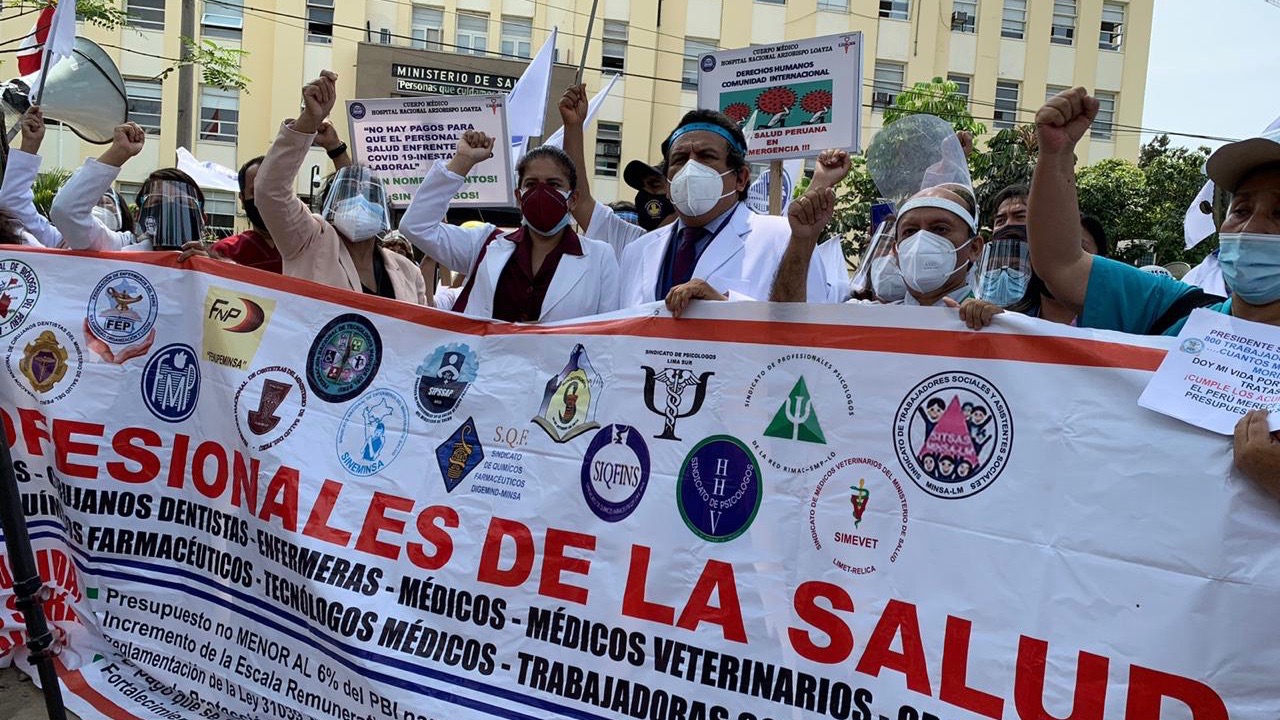The Peruvian Medical Federation (FMP) and ten other health workers unions began an indefinite national strike on January 13. The measure was taken in the absence of an agreement with President Francisco Sagasti’s administration on improving the working conditions of healthcare personnel in the face of COVID-19 pandemic.
On the first day of the strike, in the capital city Lima, hundreds of doctors, nurses and health workers held a massive demonstration in front of the health ministry to draw attention towards their legitimate claims and demand their immediate compliance.
The healthcare professionals are demanding a greater budget for the public health sector in 2021. Peru is one of the Latin American countries that invests the least in the health sector. Currently the health budget is 2.4% of the country’s total Gross Domestic Product (GDP). The unions stress that given the unprecedented situation due to the COVID-19 pandemic, there is a need to increase it to 6%.
The implementation of the third and fourth phases of the new salary scale; respect for law 31039 on appointment, automatic promotion, change of occupation and career line for health workers; timely salary payment to third category and CAS (contractual) health workers; complete payment of the complementary hours and COVID-19 bonus to all health workers, which has not been delivered since October last year; good quality PPE kits and regular rapid testing for all workers; no dismissal of any contractual or third category health workers; voluntary return to work of doctors over 60 and under 65 years of age; etc. are some of their other demands.
🔵👊🏻 #HuelgaNacional
Huelga Nacional de los profesionales asistenciales del sector salud.
Miércoles 13 de enero 2021.@canalN_ @RPPNoticias @larepublica_pe @Latina_Noticias @PTV_Noticias @willaxtv @NicolasLucar @exitosape @noticiAmerica @atv_noticias @noticias_tvperu pic.twitter.com/QcIlm5UFrg— Federación Médica Peruana Oficial (@FMedicaPeruana) January 8, 2021
Godofredo Talavera, president of the FMP, in various interviews, stressed that increasing budget is important in order to resolve the lack of ventilators, ICU beds, oxygen cylinders, molecular diagnostic kits and other medical materials; to ensure timely payment of salaries and bonuses to those fighting the pandemic at the frontlines and to pay to the existing contractual health personnel and hire additional to meet the growing requirement.
Talavera said the health professionals under these conditions are facing difficulty in serving the citizens, however, he stressed that during the strike they will continue to provide assistance to their patients.
“Whenever we have been on a protest, we have never abandoned patients, we will continue to attend emergency, intensive care units, hospitalization, special patients and all those with diagnosis and suspicion of COVID-19,” said doctor Talavera.
Talavera reiterated that they are ready to dialogue with the government and discuss their demands, however, they have not received any response.
The call for the strike was given by the FMP on December 21 and the organization tried to establish a dialogue with the health ministry various times through letters and requests. The unions are also demanding the resignation of health minister, Pilar Mazzetti, for her refusal to engage in a dialogue.
The health crisis in Peru is exacerbating. On January 13, the country recorded around 3,000 new cases of the coronavirus infection and over 70 deaths in one day. As of January 13, the country has recorded 1,021,058 cases of COVID-19 and 37,873 deaths due to the disease.
At a press conference yesterday, the government authorities announced a series of restrictions to curb the spread such as the extension of night curfew in the majority of the country’s regions and implementation of complete lockdown in some provinces, which will come into effect from January 15.
In recent weeks, President Sagasti announced the purchase of 38 million doses of the COVID-19 vaccine produced by Chinese company Sinopharm, however, no probable date as of when they will arrive was given.





